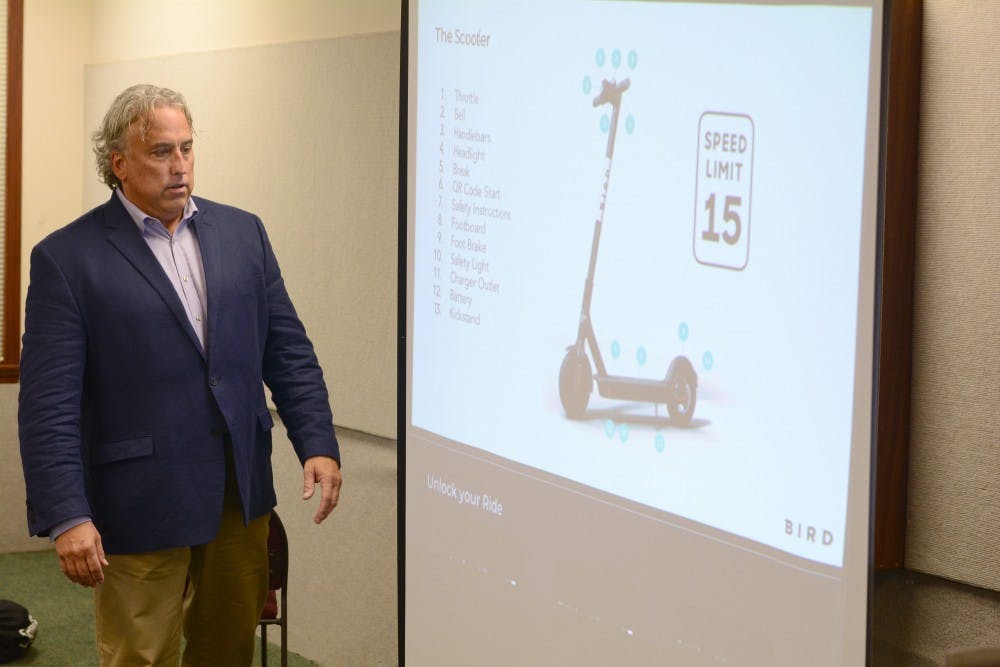The City of Oxford plans to pursue bringing Bird scooters to town in the next two weeks, despite Miami University's reservations expressed in last week's cease and desist letter.
"From my perspective as mayor, the city is going to go ahead with this project, regardless," Oxford Mayor Kate Rousmaniere said.
Rousmaniere hopes that once people see how the system works in practice, they will be more likely to support the endeavor.
"We're not required to talk to the university," Rousmaniere said. "We did it as a courtesy, really. But we hope to see improvements on that front in the coming months."
David Creamer, senior vice president for finance and business services at the university, said university officials are willing to continue pursuing discussion on the topic but request that the city delay bringing the scooters until more discussion and analysis takes place.
Creamer said the university is waiting to hear back as to when those discussions will occur. Once those steps are taken, Creamer said, the university will evaluate whether university policy should be amended.
Alan Kyger, Oxford's economic development director, announced in the Student Community Relations Committee (SCRC) meeting last week that there are plans in place to reserve on-street parking spaces as officially designated stations, or "nests," for the Bird Scooters pilot program in the Uptown District.
Kyger said the city is doing what they can to ensure the pilot program will serve everyone well.
"We asked ourselves, 'How do we make this work best for our community?' And we are following that answer as best we can," Kyger said.
Oxford has also requested that Bird Rides, Inc. set a geo-fence along High Street between Campus and College Aves. The geo-fence would prohibit scooters from being operated on the sidewalks in that area.
Bird Rides, Inc. could also potentially set a geo-fence around the university to the same effect.
As part of the permitting process Bird went through to work with the city, the city will receive a share of the revenue from the e-scooters. The city will receive $1 per day, per scooter in operation. The initial scooter fleet will be comprised of 100 scooters, so the city will receive $100 per day from Bird Rides, Inc.
Enjoy what you're reading?
Signup for our newsletter
The revenue sharing is meant "to promote bike and scooter safety, as well as improvements to the infrastructure for bikes and scooters," said city manager Doug Elliot in an email to city council with university president Greg Crawford cc'ed.
According to a document answering the city's questions about Bird, Bird Rides, Inc. said they "would be happy to offer $1 per day per Bird scooter for the University to enhance multimodal transportation options, like bike and Bird lanes," should the university choose to reconsider their e-scooter policy.
The aforementioned document also states that internal Bird user studies show that every Bird ride takes away 0.75 car trips, thereby limiting the carbon emissions inherent in relying on students driving their cars to and from campus.
Miami's Climate Action Plan goals include reducing carbon emissions by 20 percent by 2020.
Adam Sizemore, the director of the university's sustainability committee, said the committee had not been consulted when the policy to ban e-scooters was drafted.
"It may come across my table eventually," Sizemore said. "There was a lot of confusion about it on the committee. I do know the university is trying to study it the best they can."
Creamer said the university's main concern is ensuring both the perspectives of scooter users and pedestrians is considered.
"Once we are confident in how those groups will both be best served, then we would be more willing to examine and assess current university policy," Creamer said.
Rousmaniere said, after the SCRC meeting, the city is confident the program will serve the community well and has put months of effort into bringing an alternative form of transportation to town.




